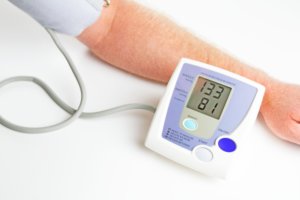Zinc deficiency plays a role in high blood pressure
 Elevated blood pressure causes more premature deaths worldwide than any other factor. Blood pressure is regulated by a number of things such as diet and lifestyle. Science has also discovered that low blood levels of zinc contribute to high blood pressure because it impairs the ability of the kidneys to regulate sodium levels. This was demonstrated recently in a study that is published in American Journal of Physiology – Renal Physiology. Clinical zinc deficiencies are especially common among type 2 diabetics and people with kidney ailments. Subclinical zinc deficiency is also quite common. Even if you get plenty of zinc from your diet, the risk of poor zinc absorption increases with age. Vegetarian and vegan diets, overconsumption of calcium, drinking too much alcohol, using birth control pills and several types of medicine, plus certain other factors can also increase the risk of a zinc deficiency.
Elevated blood pressure causes more premature deaths worldwide than any other factor. Blood pressure is regulated by a number of things such as diet and lifestyle. Science has also discovered that low blood levels of zinc contribute to high blood pressure because it impairs the ability of the kidneys to regulate sodium levels. This was demonstrated recently in a study that is published in American Journal of Physiology – Renal Physiology. Clinical zinc deficiencies are especially common among type 2 diabetics and people with kidney ailments. Subclinical zinc deficiency is also quite common. Even if you get plenty of zinc from your diet, the risk of poor zinc absorption increases with age. Vegetarian and vegan diets, overconsumption of calcium, drinking too much alcohol, using birth control pills and several types of medicine, plus certain other factors can also increase the risk of a zinc deficiency.
We humans only absorb around 10-30 percent of the zinc that is in our food. Zinc is a co-factor of more than 1,000 enzymatic processes and it is bound to around 10 percent of our proteins. Zinc has vital importance for a host of cellular processes that control growth, metabolism, the nervous system, fertility, etc. In this article, we will take a closer look at zinc’s influence on blood pressure.
Potassium, sodium, and zinc are important for blood pressure
Our kidneys regulate our blood pressure, and the balance between sodium and potassium is crucial. The kidneys cleanse the blood, and every day, around 180 liters of fluid are filtered through the kidneys. However, most of it is retracted, including potassium and sodium. If a person consumes a lot of sodium or is unable to excrete excess sodium via the kidneys, sodium piles up, thereby posing a risk of edemas or increased blood pressure.
Elementary research shows that the intake of potassium directly affects the regulation of renal sodium excretion, but now it looks as if zinc also plays a role.
Zinc influences the kidneys’ excretion of sodium
The kidneys excrete sodium in the urine by ways of the sodium chloride transporter (NCC). Lower levels of sodium in the urine may typically result in elevated blood pressure.
According to the new research, zinc helps regulate proteins that are important for NCC and, as a result of this, the excretion of sodium
The researchers compared male mice with provoked zinc deficiency with male, non-deficient mice. The zinc-deficient mice developed hypertension and also excreted less sodium. The other group of mice (the control group), however, did not experience these changes. Halfway through the study, some of the zinc-deficient mice were fed a diet that was rich in zinc. As soon as their zinc levels were adequate, their blood pressure dropped, and they started excreting more sodium. According to the scientists, these significant observations show that zinc plays a vital role in helping the kidneys excrete sodium, and a zinc-deficiency impairs the ability to control blood pressure. They assume that lack of zinc may play a vital role in the onset of elevated blood pressure, an observation that should considered in anti-hypertensive therapies.
Zinc deficiencies are rather common
An estimated 12 percent of the American population lacks zinc, and 40 percent of them belong to the older generations. A similar pattern can be expected in Europe. Zinc deficiencies are caused by poor diets, lack of animal protein, high calcium consumption, alcohol abuse, diuretics, birth control pills, and copper poisoning. The widespread zinc deficiencies among older people is especially linked to their impaired uptake of nutrients. Even if an older person eats enough zinc-containing foods, the age-related absorption issues can easily result in zinc-deficiencies in the cells. Another contributing factor is medicine, which many older people take on a daily basis.
Clinical zinc deficiency is especially common among type 2 diabetics and people with kidney ailments. However, there are also many people who have subclinical zinc deficiency.
|
A blood test can reveal a zinc deficiency, but the test is uncertain, as we have most of our zinc in the cells of the different tissues. |
Choose organic zinc supplements that the body can absorb and utilize
The most important thing is to make sure to get enough zinc from the diet. Many zinc supplements contain inorganic sources like zinc sulphate and zinc oxide that are not absorbed all that easily in the body. It is better to take organic forms such as zinc gluconate and zinc acetate, which the body can easily absorb and utilize. Always study the label on your supplement to see what type of zinc it contains.
References
Clintoria R Williams et al. Zinc deficiency Induces Hypertension by Promoting Renal Sodium Reabsorption. American Journal of Physiology – Renal Physiology. 2019
American Physiological Society. Zink deficiency may play a role in high blood pressure. ScienceDaily 2019
Zinc deficiencies is a global concern. Oregon State University. 2009
Search for more information...
- Created on .








